HIST 1B
California State University - San Jose State University
Page 2 out of 34 results
Sort by
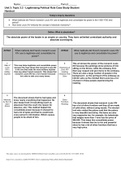
-
HIST 1b - Unit 3_ Legitimizing Political Rule (Student Handout)
- Exam (elaborations) • 4 pages • 2023
-
- $9.49
- + learn more
Unit 3: Topic 3.2 - Legitimizing Political Rule Case Study Student Handout Today’s Inquiry Questions ● What methods did French monarch Louis XIV use to legitimize and consolidate his power in the 1450-1750 time period? ● How does Louis XIV embody the concept of absolute monarchy? Define: What is absolutism? The absolute power of the leader in an empire or country. They have unlimited centralized authority and absolute sovereignty. Artifact What methods did French monarch Louis XI...

-
HIST 1b Unit 5_ Atlantic Revolutions Graphic Organizer
- Exam (elaborations) • 3 pages • 2023
-
- $10.49
- + learn more
American Revolution 1765-1783 French Revolution 1789-1799 Haitian Revolution 1791-1804 What factors caused this revolution? Be specific. The American colonists wanted independence from the rule of the British. The ideas of Enlightenment also helped them to start a revolution against the British. During this period, France had economic instability. The monarch collects a lot of taxes and most of the money they collect is used to aid American colonists for the American revolut...
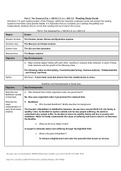
-
HIST 1b Unit 3 - Land-Based Empires
- Exam (elaborations) • 6 pages • 2023
-
- $9.49
- + learn more
Part 2: The Classical Era, c. 600 B.C.S. to c. 600 C.E. Region Empire Western Eurasia The Persian, Greek, Roman and Byzantine empires Southern Asia The Mauryan and Gupta empires Eastern Asia The Qin and Han dynasties Mesoamerica The Mayan empires Objective Key Developments A. Major empires began trading with each other, resulting in massive trade networks. A result of these trade networks was the growth of the following cities: The following cities are Rome(Italy), Constantinople(Turkey...
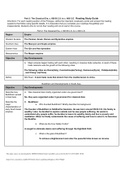
-
HIST 1b - Unit 3 - Land-Based Empires 1450-1750.
- Exam (elaborations) • 6 pages • 2023
-
- $8.49
- + learn more
Part 2: The Classical Era, c. 600 B.C.S. to c. 600 C.E. Region Empire Western Eurasia The Persian, Greek, Roman and Byzantine empires Southern Asia The Mauryan and Gupta empires Eastern Asia The Qin and Han dynasties Mesoamerica The Mayan empires Objective Key Developments A. Major empires began trading with each other, resulting in massive trade networks. A result of these trade networks was the growth of the following cities: The following cities are Rome(Italy), Constantinople(Turkey...
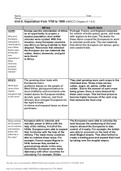
-
HIST 1b All Units with Final Exam & Study Guides d ,assignment, study guide all in this package deal Complete(Latest Update 2023)
- Package deal • 18 items • 2023
-
- $25.49
- + learn more
HIST 1b All Units with Final Exam & Study Guides d ,assignment, study guide all in this package deal Complete(Latest Update 2023)

-
HIST 1b Unit 6_ Imperialism from 1750-1900.
- Exam (elaborations) • 4 pages • 2023
- Available in package deal
-
- $8.49
- 1x sold
- + learn more
CAUSES Why were Europeans interested in colonizing this area? What factors were driving this new imperialism? What resources attracted European interest? Europe saw the colonization of Africa as an opportunity to acquire a surplus population, thus settler colonies were created. With this invasion, many European countries saw Africa as being available to their disposal. Resources that attracted the European are raw materials like rubber, timber, diamonds, and gold were fou...
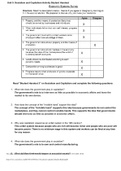
-
HIST 1b Unit 5_ Socialism & Capitalism Student Handout
- Exam (elaborations) • 6 pages • 2023
- Available in package deal
-
- $8.49
- + learn more
1. What role does the government play in capitalism? The government’s role is to intervene as little as possible in economic affairs and leave the market to its own device. 2. How does the concept of the “invisible hand” support this idea? The concept of the “Invisible hand” supports this idea because governments do not control the marketplace, and they cannot control invisible hands. This supports the idea that governments should intervene as little as possible in economic affai...

-
HIST 1b Unit 6 - Indian Revolt of 1857 Handout.
- Exam (elaborations) • 2 pages • 2023
- Available in package deal
-
- $8.49
- + learn more
Unit 6 - Indian Revolt of 1857 (Sepoy Rebellion) Essential Question: What caused the Indian Revolt of 1857? Docu ment According to this document, what caused the Sepoy Rebellion? A The sepoys thought that the grease is made out of cows, which led to the rebellion because the Indian are hindu and they see cows as sacred creatures. By eating cows, it made them turn against the gods' will and this made them become mad. B According to document B, the cause of Sepoys rebellion came from conv...

-
HIST 1b Unit 6_ Imperialism from 1750-1900
- Exam (elaborations) • 4 pages • 2023
- Available in package deal
-
- $8.49
- + learn more
Unit 6: Imperialism from 1750 to 1900 (AMSCO Chapters 6.1-6.5) Africa South Asia CAUSES Why were Europeans interested in colonizing this area? What factors were driving this new imperialism? What resources attracted European interest? Europe saw the colonization of Africa as an opportunity to acquire a surplus population, thus settler colonies were created. With this invasion, many European countries saw Africa as being available to their disposal. Resources that attracted the Eu...

-
HIST 1b Unit 5_ Land Empire Reforms_Industrialization.
- Exam (elaborations) • 3 pages • 2023
- Available in package deal
-
- $8.49
- + learn more
Unit 5: Land Empires – Reform and Modernization (AMSCO pgs 317-321; 334-338) Ottoman Empire Japan (Meiji Era) What caused or instigated the reform movements in this empire? They worry about outside empires interfering with them. They were particularly concerned with European powers interfering with their affairs. Which led to the reform movements in this empire. When their feudal system began to crumble, they had to start making changes. They were able to legitimize the rule by re...

Did you know that on average a seller on Stuvia earns $82 per month selling study resources? Hmm, hint, hint. Discover all about earning on Stuvia


